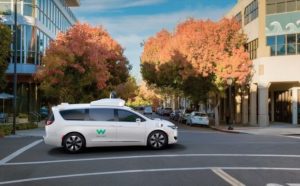
Lost in all of the headlines about lower advertising margins, a marketwide sell-off, and its lawsuit against Uber, Alphabet (NASDAQ: GOOG) (NASDAQ: GOOGL) management made a rather exciting announcement regarding self-driving-car unit Waymo on its last earnings call. Combined with the current lawsuit, these recent events could signal big trouble for the still-private Uber, and potentially very good news for Alphabet shareholders. Here’s what you need to know.
A Waymo app
On the recent earnings call, Alphabet CFO Ruth Porat announced that Waymo will be releasing its own Waymo-branded ridesharing app later this year. The company had been engaging its early rider program in Phoenix throughout 2017, but apparently, Waymo is now ready to take the next great leap forward to a full-fledged Waymo service for the masses.
What also may have gone unnoticed was a January news item that Waymo had ordered “thousands” of Chrysler Pacifica minivans from Fiat Chrysler (NYSE: FCAU), which is the car Waymo used in the 100-vehicle early rider program. The order signals that Waymo is ready for widespread deployment, with Waymo CEO John Krafcik announcing, “with the world’s first fleet of fully self-driving vehicles on the road, we’ve moved from research and development to operations and deployment.”
This announcement is further evidence of Waymo’s overall lead in self-driving cars, especially regarding safety. In January, the state of California released its self-driven-miles data for the 12-month reporting period ended last November. The results showed Waymo as the clear leader, with over 352,000 miles driven in California, representing 70.3% of the self-driven miles in the state — a huge lead over the 131,000 miles driven (26.16%) by second-place General Motors’ (NYSE: GM) self-driving unit Cruise Automation.
Not only did Waymo score more miles, but its disengagement rate fell to 0.18 per thousand miles, down from 0.20 in 2016. For reference, a disengagement occurs when a human monitor has to assume control of the autonomous vehicle. Waymo’s figure was also well below GM-Cruise, which scored a 0.8 disengagement rate, though GM claimed this was a huge 1400% improvement from 2016, which, admittedly, is also impressive.
Bad news for Uber
The recent announcements could portend trouble for Uber. If the future of ridesharing is self-driving, I’m not sure why anyone would opt for an Uber self-driving service over a Waymo service or even a Cruise service for that matter. Even if Uber were able to come out with its own self-driving features, new competition from well-funded tech companies would spell trouble for the company, which is still unprofitable, according to its financial releases.
And now, with the Waymo-Uber court trial underway, the story may be getting worse. If Uber is found to have violated Waymo’s intellectual property rights by hiring away a former Waymo engineer accused of illegally taking thousands of Waymo documents, it could halt Uber’s self-driving aspirations indefinitely. In fact, even though Uber is the dominant ridesharing brand right now, a negative outcome at trial could potentially be a mortal wound for the company.
Where are the others?
Some may be wondering where Tesla (NASDAQ: TSLA) and Apple (NASDAQ: AAPL) fit into the California data. Tesla reported zero actual miles but claimed that it had “shadow tested” its vehicles “via simulation, in laboratories, on test tracks, and on public roads in various locations around the world,” and can also gather data from its non-self-driving cars on the road today.
Apple may also be engaging in extensive off-the-radar testing, which would fit in with the company’s secretive tradition. In December, I wrote about a breakthrough Apple researchers have made in self-driving sensor technology, despite the small amount of road-testing it had done. In addition, due to Apple’s strong brand, it doesn’t necessarily have to be first to market or the lowest-cost provider; after all, it wasn’t the first smartphone-maker.
Google is getting interesting
While Alphabet’s stock has done well over the past year, it has actually lagged its fellow FANGs. However, with Waymo potentially taking off and its Cloud platform showing the fastest growth of any public cloud player, Alphabet’s non-advertising businesses may become much more meaningful in the year ahead. Investors should take note.


